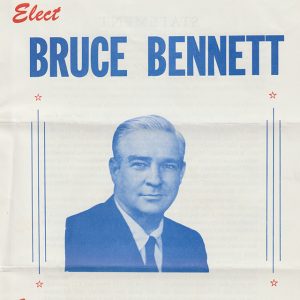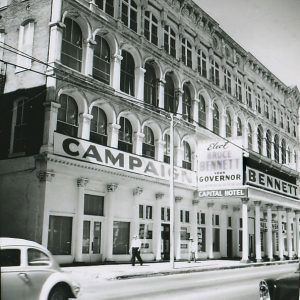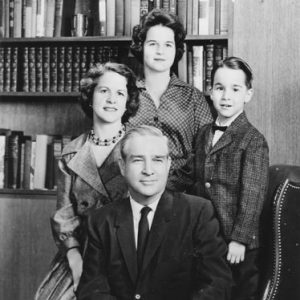calsfoundation@cals.org
Bruce Bennett (1917–1979)
Bruce Bennett was Arkansas’s attorney general from 1957 to 1960 and from 1963 to 1966. As the state’s leading legal authority, he became known as much for flouting the law as for upholding it. In the wake of the Little Rock (Pulaski County) desegregation crisis, Bennett authored legislation to bypass federal desegregation orders, including acts “designed to harass” the National Association for the Advancement of Colored People (NAACP). He gained further notoriety in asserting that communist influence underlay the racial unrest in Arkansas. Toward the end of his career, Bennett became infamous for his part in the securities fraud scandal involving the Arkansas Loan and Thrift.
Bruce Bennett was born on October 31, 1917, to Oakley Adair Bennett and Anita Bennett in Helena (Phillips County). In 1921, the family moved to El Dorado (Union County), where Bennett completed his public school education. After high school, he studied pre-law at El Dorado Junior College and Third District Agricultural and Mechanical College, now Southern Arkansas University, in Magnolia (Columbia County).
In 1940, Bennett joined the Army. In 1942, he was commissioned a second lieutenant. He served fourteen months in Europe and returned to the United States for pilot training. Toward the end of World War II, he was redeployed to the South Pacific as the commander of a B-29. In thirty missions over Japan, he earned the Distinguished Flying Cross, the Air Medal with three clusters, and a Bronze Star. After the war, Bennett attended Vanderbilt University Law School, earning a degree in 1949. South Arkansas voters elected him prosecuting attorney of the Thirteenth Judicial Circuit in 1952 and 1954. He was elected attorney general in 1956, 1958, 1962, and 1964, before losing to Joe Purcell in the 1966 Democratic primary. Bennett ran unsuccessfully for governor in 1960 and 1968.
In 1958, Bennett shared the spotlight with Governor Orval Faubus when he authored a set of bills “designed to harass” civil rights protestors he considered “the enemies of America.” The bills specifically targeted the NAACP, preventing the group from providing legal counsel or funding lawsuits in the state, opening NAACP membership lists and personnel records to state scrutiny, and preventing NAACP members from becoming state employees.
Like many Southerners, Bennett publicly associated the NAACP with an international communist conspiracy in order to discredit its desegregation efforts. He painted the civil rights movement “red” in public hearings of the Arkansas Legislative Council’s Special Education Committee and as an “expert” witness in Tennessee. Bennett’s claims extended to any opponent of his views. During his 1960 segregationist campaign for governor, he accused Faubus, the resister of desegregation in Little Rock, of being a secret ally of state NAACP leader Daisy Bates.
Bennett’s controversial political views were further highlighted by his participation in the Arkansas Loan and Thrift scandal. He helped found the institution, which padded officers’ accounts by soliciting investors for questionable industrial development projects. Company leaders profited as investors lost when the company went bankrupt in 1967. While attorney general, Bennett protected the company from state regulation in an opinion declaring the company beyond Arkansas’ securities laws. In 1969, he was charged with twenty-eight counts of securities violations, postal fraud, and wire fraud. His ten-year struggle with throat cancer prevented him from facing trial. He died on August 26, 1979, and was buried in Arlington Cemetery in El Dorado. He was survived by his wife Rebecca and his children, James and Susan. Rebecca Bennett died in 2008.
For additional information:
Reed, Roy. Faubus: The Life and Times of an American Prodigal. Fayetteville: University of Arkansas Press, 1997.
Newkirk, Anthony B. “‘A Delicate Matter’: The 1958 Special Education Committee Hearing.” Arkansas Historical Quarterly 78 (Autumn 2019): 274–295.
Woods, Jeff. Black Struggle, Red Scare: Segregation and Anticommunism in the South, 1948–1968. Baton Rouge: Louisiana State University Press, 2004.
Jeff Woods
Arkansas Tech University








Comments
No comments on this entry yet.